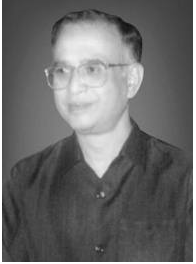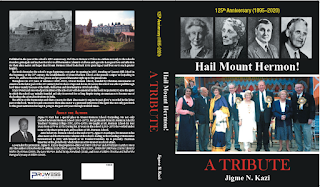Death of A Judge
Justice Anup Deb: Did he commit suicide or was he
murdered?
 |
| Justice Anup Deb |
More
than a decade after his sudden demise the mystery of Justice Anup Deb’s death
refuses to fade away, at least among those who were close to him.
He
was a Judge and I a journalist but what bound us together for more than two
decades was our friendship nurtured down the years through turbulent times. When
I got a call from someone early morning on March 14, 2002 I rushed to Justice
Debs’ official residence at Balwuakhani in Gangtok only to find out that he was
no more. The official version of Justice Deb’s death was that he hung himself
in his official residence in the night of March 13.
Justice
Deb was a strong and determined person and those, like myself, who knew him
from close range found it very difficult to believe that he had committed
suicide.
“Unable
to bear his prolonged illness, sitting High Court Judge Justice Anup Deb
committed suicide,” a national daily reported. It added “…an ailing Justice Deb
(59) hanged himself in the bedroom of his official residence here shortly after
midnight leaving a suicide note stating "I cannot bear my illness
anymore."
However, Deb’s personal physician Dr. K. Bhandari of Sir Thutob Namgyal
Memorial Hospital (STNM) said he was not suffering from any terminal or serious
diseases. It is the first time in India’s history that a sitting Judge commits
suicide, reported Sikkim Express.
My
own English weekly, Sikkim Observer, which
many times reported on Justice Deb’s pronouncements in the court, was out of
print during this period and failed to carry anything on his death. I hope this
piece will to some extent do justice to the departed soul and compensate for my
failure to carry anything on circumstances surrounding his tragic death which
still remain shrouded in mystery.
Deb
was elevated to the rank of a Judge of the Sikkim High Court from the State
Advocate General's post in 1994. He was transferred to the Agartala bench of
the Gauhati High Court in February 1995 and then moved to the Orissa High Court
in March 1996 before returning to Sikkim High Court in December 1997. During
his tenure in the Sikkim High Court he also held the post of Acting Chief
Justice for some time.
“Don’t
meditate too much. Look after your family,” were his last words to me and my
wife when we went to see him and his wife at his Gangtok residence. He was in a
good mood and we had a good time. That was, I think, the last time we met. Most
of the time Justice Deb lived alone in his residence while his wife and
children resided in neighbouring Siliguri, his home town.
Since the Chamling Government slapped two
cases on me regarding my press and residence in early 2001 and since Justice
Deb was hearing these cases I made it a point not to be around him. But by
early 2002 I learnt that he was not his normal self. During this period he once
told me that he had information from the Union Home Ministry that his life was
in danger. He used to often seek divinations for even traveling to Siliguri and
Delhi. Lots of pujas were also performed for his safety and security. At times
he was quite paranoid about his personal safety. “Some people think I’m running
a parallel government!,” Deb used to tell me at times and then burst into
laughter. Indeed, some of his observations and verdicts in the court made the
administration sit up and take note.
Realising
that he was not keeping well I made it a point to see him and personally find
out what was troubling him. I had some paper works to do at the High Court on
March 13 which took some time. It was then I decided to go and see him in his
office at the High Court premises. He was not there and I was told he was with
Chief Justice R. Dayal in his office. I waited for sometime and left a word in
his office that I had come to see him.
I
was expecting a call from him in the afternoon or evening of the same day. Justice Deb usually calls me to his residence
whenever I wanted to see him or the vice-versa. We normally chat over a cup of
tea and snacks prepared by his cook. But this time there was no calls from him
and early the next day I get a call saying he is no more.
My
first encounter with Justice Deb was way back in the winter of 1983. I was just
fresh out of college and into journalism. What brought us together was a writ
petition filed in the Supreme Court on seats reserved for Sikkim’s indigenous
Bhutia-Lepchas (BLs) in the Sikkim Legislative Assembly by Ram Chandra Poudyal,
then perhaps the most popular and articulate leader of the Nepalese community
in Sikkim.
In
his writ petition, Poudyal, a former minister in the Kazi Cabinet (1974-1979),
sought to do away with 12 Assembly seats reserved for the Bhutia-Lepchas and 1
for the Sangha, representing Buddhist monasteries in Sikkim. Deb, who was then
the Additional Advocate General of Sikkim, sought my help to defend the case on
historical ground. He said we would lose the case if we depended solely on
legal and constitutional grounds. I took leave from Eastern Express, where I was working, and prepared the papers to
defend the 13 reserved seats of the BLs and Sangha in the Supreme Court.
When
the case came up for hearing in early 1984 before the Supreme Court Poudyal was
asked to “withdraw” his petition. The five-judge constitution bench headed by Supreme
Court Chief Justice, Justice YB Chandrachud, which took note of the historical
background on Assembly seat reservation for the minority indigenous communities
in Sikkim, was in our favour. However, Poudyal tactfully delayed hearing of the
petition for several years and when it did come up for hearing in early 1993 we
won the case.
“The
inequalities in representation in the present case are an inheritance and
compulsion from the past. Historical considerations have justified a
differential treatment,” read the verdict of the apex court. These were the
same observations made by the apex court in February 1984. If Justice Deb had not advised us to depend on
our history to defend our case we may have lost our battle in the apex court
and that would have been disastrous for Sikkim.
When
we finally won the case in 1993 it was my privilege to have Justice Deb, Sonam
P. Wangdi, now Judge of Sikkim High Court, then a Sikkimese lawyer who was once
Deb’s junior, and my friend Chewang Tobgay, who represented Sikkim Tribal
Welfare Association (STWA) in the case as an intervening party, at my residence
at Deorali for lunch. It was time to celebrate for our victory. Former Home
Secretary, Late Jigdal T. Densapa, who was a part of our team representing the
State Government, was the only person missing from the table.
I
was the last person to place a khada
on Deb when his body was placed in the crematorium on the banks of Mahananda
River in Siliguri during the funeral. I vividly recollect what came to my mind
when I first passed the Mahananda bridge, located near the cremation place,
after Deb’s death. As I looked over the
bridge across to where the last remains of Justice Deb’s body were turned into
ashes and then immersed into the river these words from the man whom I loved
and respected flashed through my head: “Don’t look back. Look forward. I did my
job. Now you do yours.” Was he referring to the Assembly seat issue? I often
wonder about this but have no answers. However, I know that our mission on
Assembly seat issue for both the Bhutia-Lepchas and Sikkimese Nepalese is still
unfinished. Whenever I pass through that bridge I look over to the same spot
and whisper some prayers for the one who is now no more but who still lives in
my memory.
Did
Deb really commit suicide or did someone hang him? During the tragic incident,
Deb’s younger brother, Goutam Deb, now Chief Minister Mamata Banerjee’s
troubleshooter in Darjeeling and also North Bengal Development Minister, was
heard uttering these words in front of Justice Dayal and other officials: “Cold
blooded murder.”
The
Sikkim unit of the Congress party’s demand for a CBI probe into the incident
went unheeded. The fact that one of Deb’s prominent friends in college was
senior Congress leader Pranab Mukherjee – now India’s President – did not evoke
much response from the authorities. Former Chief Minister NB Bhandari also doubted
the suicide claim of the government.
Years
later, a highly-placed Sikkimese civil servant close to Deb who has now
retired, told me that the former Acting Chief Justice of Sikkim High Court did
not commit suicide but was forcefully hung in his toilet. To prove his point he
said there was no probe into the incident and the policeman who was guarding
Justice Deb’s residence during that period died mysteriously one month after
the tragic incident. The constable’s wife also committed suicide shortly after
her husband’s death. Reportedly, the couple hung themselves.
No
matter how Justice Deb may have met his end I strongly believe that it was the
system that thrives on lies, deceit and corruption that put an abrupt end to
his life.
(Ref: Talk
Sikkim, October 2013.)



.jpg)
.jpg)
.jpg)










